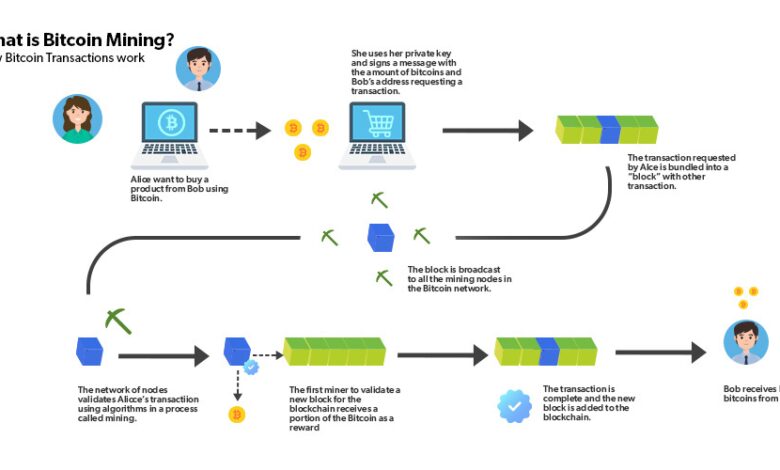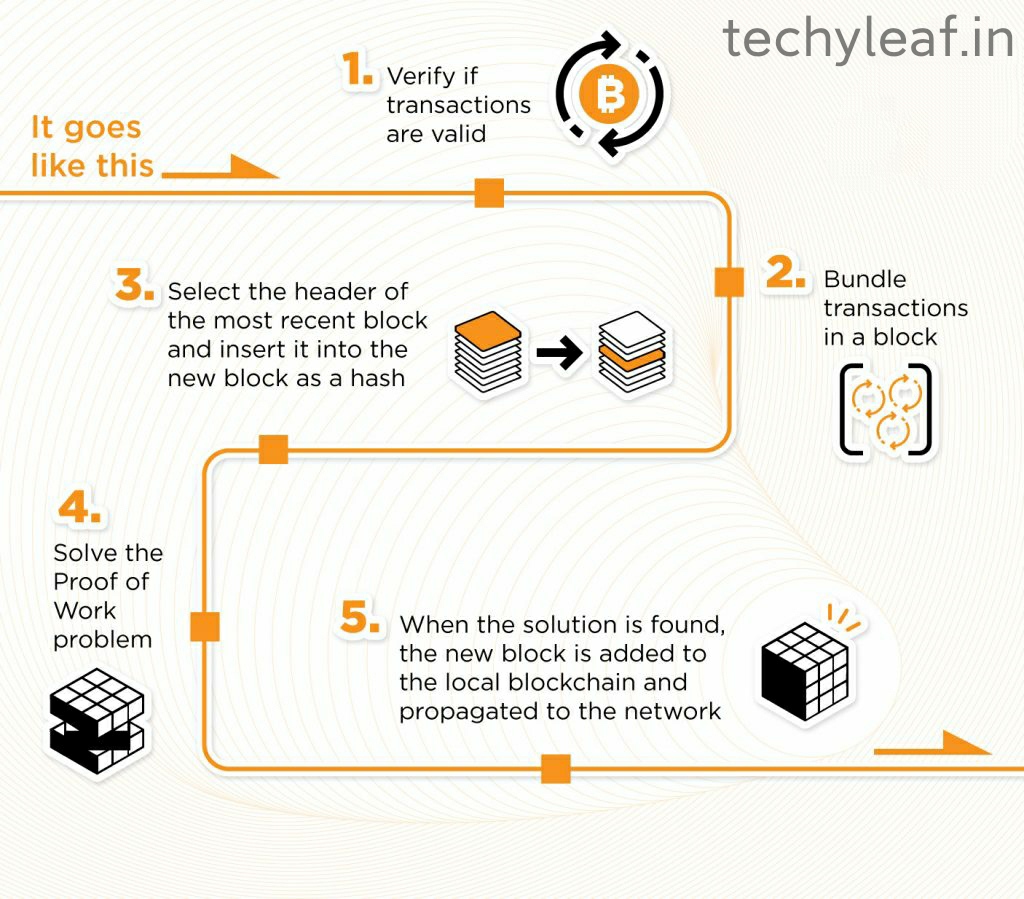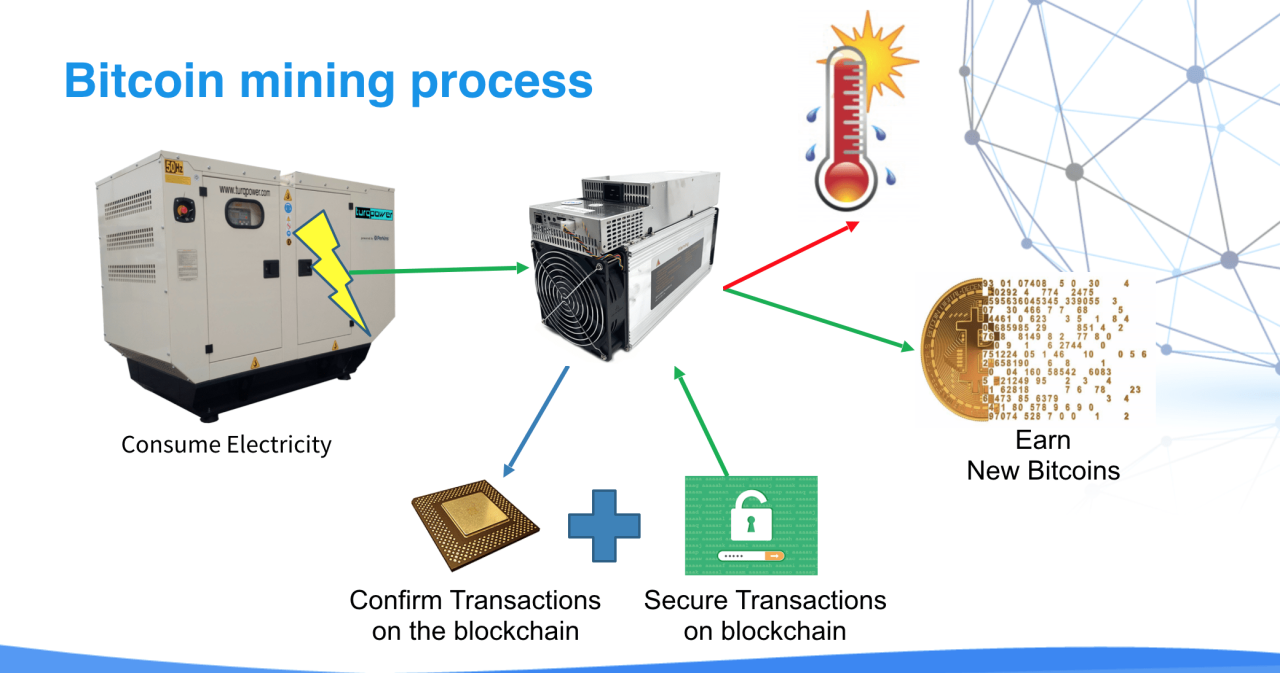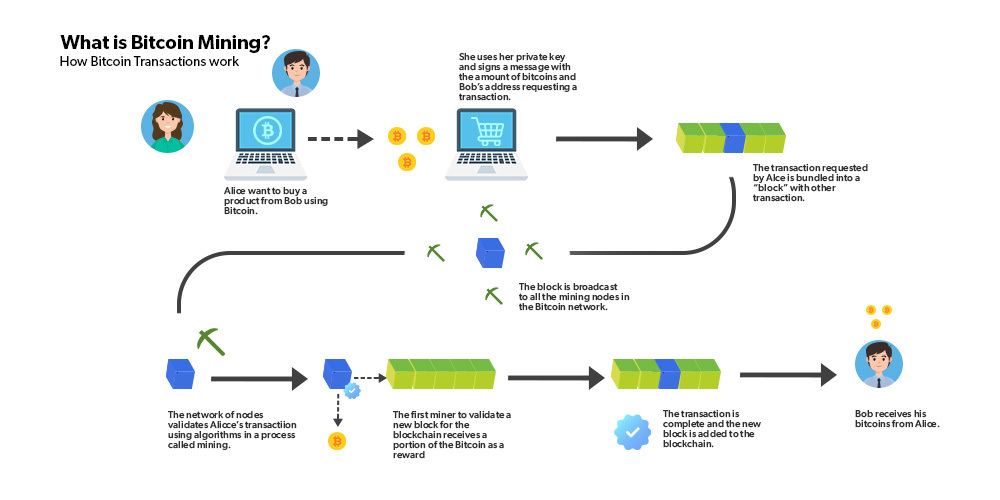
Bitcoin Mining and Smart Contracts: A Powerful Partnership
Bitcoin mining and smart contracts, two seemingly distinct concepts, are actually deeply intertwined in the world of blockchain technology. Bitcoin mining, the process of verifying and adding transactions to the Bitcoin blockchain, is crucial for securing the network. Smart contracts, on the other hand, are self-executing agreements written in code that automate and streamline transactions, making them more efficient and transparent.
Together, these two forces create a powerful synergy that is transforming the way we think about finance, commerce, and even governance.
In this blog post, we’ll delve into the intricate relationship between Bitcoin mining and smart contracts, exploring their individual roles, the benefits they offer when combined, and the challenges they face in their quest to revolutionize the digital landscape. We’ll also discuss real-world applications of these technologies, from decentralized finance (DeFi) to supply chain management, and explore the future possibilities that lie ahead.
Bitcoin Mining and its Role in the Blockchain

Bitcoin mining is a fundamental process that underpins the entire Bitcoin network, ensuring its security and enabling transactions. It’s a complex but essential aspect of the decentralized, peer-to-peer nature of Bitcoin.
The Process of Bitcoin Mining
Bitcoin mining involves specialized computers solving complex mathematical problems to add new blocks to the Bitcoin blockchain. This process, known as “proof-of-work,” is essential for verifying and securing transactions on the network. Here’s a simplified breakdown:
- Transactions are broadcast:When a Bitcoin transaction occurs, it’s broadcast to the network of miners.
- Miners group transactions:Miners collect these transactions into a block, which they then try to solve.
- Solving the puzzle:Miners use powerful computers to solve complex mathematical problems. The first miner to solve the problem “wins” the block and gets to add it to the blockchain.
- Block is added to the blockchain:The solved block is added to the blockchain, creating a permanent record of the transactions.
- Reward for the miner:The miner who successfully solves the puzzle is rewarded with newly created Bitcoins and transaction fees.
Energy Consumption and Environmental Impact
Bitcoin mining requires significant computational power, leading to concerns about its energy consumption and environmental impact.
- High energy usage:The process of solving complex mathematical problems consumes substantial electricity.
- Environmental impact:The energy used for Bitcoin mining can contribute to greenhouse gas emissions and put pressure on energy grids.
- Efforts for sustainability:The Bitcoin mining industry is exploring more sustainable energy sources and efficiency improvements to mitigate its environmental footprint.
Benefits of Bitcoin Mining
While Bitcoin mining raises environmental concerns, it also plays a crucial role in securing the Bitcoin network and ensuring its integrity.
- Network security:The proof-of-work mechanism makes it extremely difficult for malicious actors to alter the blockchain or double-spend Bitcoins. This security is essential for maintaining trust in the network.
- Transaction validation:Bitcoin mining verifies and confirms transactions, preventing fraud and ensuring the accuracy of the blockchain.
- Decentralization:Bitcoin mining distributes the power of the network across many miners, preventing any single entity from controlling it. This decentralization is a key feature of Bitcoin’s security and resilience.
Smart Contracts: Bitcoin Mining And Smart Contracts
Imagine a world where agreements are automatically enforced, eliminating the need for intermediaries and reducing the risk of fraud. This is the promise of smart contracts, a revolutionary technology built on the foundation of blockchain. Smart contracts are essentially self-executing agreements written in code and stored on a blockchain, ensuring that all parties involved can trust and verify the terms of the contract.
Functionality of Smart Contracts
Smart contracts are designed to automate and streamline processes, offering a range of functionalities that extend beyond traditional contracts. Here are some key features:* Automated Execution:Once the predefined conditions are met, the contract automatically executes the agreed-upon actions.
Transparency and Auditability
All transactions and events related to the contract are permanently recorded on the blockchain, making it transparent and easily auditable.
Immutability
Once a smart contract is deployed on the blockchain, it cannot be altered or tampered with, ensuring that the terms of the agreement remain unchanged.
Security
Smart contracts are secured by the cryptographic principles of the blockchain, making them resistant to hacking and manipulation.
Efficiency
By automating processes and eliminating intermediaries, smart contracts can significantly reduce time and costs associated with traditional contract management.
Real-World Applications of Smart Contracts
The potential applications of smart contracts are vast and continue to expand as the technology evolves. Here are some notable examples:
Decentralized Finance (DeFi)
Smart contracts are the backbone of decentralized finance (DeFi), a rapidly growing sector that aims to revolutionize financial services. They enable the creation of:* Lending and Borrowing Platforms:Platforms like Aave and Compound allow users to lend and borrow cryptocurrencies directly, without the need for banks or other financial institutions.
Decentralized Exchanges (DEXs)
The world of Bitcoin mining and smart contracts is fascinating, constantly evolving with new applications and challenges. It’s a stark contrast to the tragic story of the Columbia graduate student brutally beaten in Manhattan, a reminder that real-world violence can overshadow even the most cutting-edge technology.
This news story highlights the need for both technological advancement and human compassion, as we strive for a future where security and safety are paramount, both in the digital and physical realms.
DEXs like Uniswap and SushiSwap facilitate peer-to-peer trading of cryptocurrencies, eliminating the need for centralized exchanges.
Stablecoins
Bitcoin mining, with its complex algorithms and decentralized nature, is fascinating. It’s a reminder of the power of technology to create new systems, just like the smart contracts that are revolutionizing finance. But it’s also a reminder that technology can be misused, as seen in the recent alex jones damages trial begins over his false claims sandy hook shooting was a hoax.
The trial highlights the responsibility we all have to use technology ethically, especially when it comes to spreading misinformation. The future of bitcoin and smart contracts depends on our ability to balance innovation with responsibility.
Smart contracts are used to create stablecoins, cryptocurrencies pegged to fiat currencies like the US dollar, providing a more stable store of value than volatile cryptocurrencies.
Supply Chain Management
Smart contracts can enhance transparency and efficiency in supply chains by:* Tracking Goods:Every step of a product’s journey can be recorded on the blockchain, providing real-time visibility and traceability.
Automated Payments
Smart contracts can automate payments based on predefined conditions, such as the delivery of goods or completion of tasks.
Preventing Counterfeit Products
By recording the origin and provenance of goods, smart contracts can help combat counterfeiting and ensure product authenticity.
Other Applications
Smart contracts are also finding applications in various other sectors, including:* Voting Systems:Secure and transparent voting systems can be built using smart contracts, eliminating the risk of fraud and manipulation.
Insurance
Smart contracts can automate insurance claims processing and facilitate the creation of decentralized insurance platforms.
Real Estate
Smart contracts can simplify real estate transactions by automating escrow services and ensuring secure ownership transfer.
Healthcare
Smart contracts can be used to manage patient data securely and efficiently, enabling the development of decentralized healthcare systems.
The Intersection of Bitcoin Mining and Smart Contracts
Bitcoin mining and smart contracts, two pillars of the blockchain revolution, are not entirely separate entities. Instead, they exhibit a remarkable synergy that can propel the blockchain ecosystem forward. While Bitcoin mining secures the Bitcoin network, smart contracts enable the execution of agreements on the blockchain, making them both integral components of a decentralized future.
This section delves into the intersection of these two concepts, exploring how they can complement and enhance each other.
Bitcoin Mining as a Power Source for Smart Contracts
Bitcoin mining, a computationally intensive process, generates a significant amount of computing power. This power can be harnessed to execute smart contracts, enhancing their efficiency and security. By leveraging the vast computational resources dedicated to Bitcoin mining, smart contracts can benefit from faster transaction processing times and increased security.
This concept is gaining traction as researchers explore ways to integrate smart contracts into the Bitcoin network.
Bitcoin mining is a fascinating process, fueled by complex algorithms and sophisticated hardware. Smart contracts, on the other hand, are automated agreements that execute themselves based on predefined conditions. But what happens when you’re wronged in the world of crypto?
Well, that’s where the wisdom of how to stay right when you’ve been wronged comes in. Understanding the intricacies of blockchain technology and its legal implications can help you navigate disputes and ensure fair outcomes. Ultimately, staying informed and proactive is key to protecting your investments in the ever-evolving landscape of Bitcoin mining and smart contracts.
- One potential approach involves using the Bitcoin network’s consensus mechanism, Proof of Work (PoW), to power smart contract execution. This would involve miners dedicating a portion of their computational power to running smart contract code alongside Bitcoin transactions. This could lead to a more robust and secure execution environment for smart contracts.
- Another possibility is the development of hybrid systems that combine the security of Bitcoin’s PoW with the efficiency of other consensus mechanisms like Proof of Stake (PoS) for smart contract execution. This approach could leverage the computational power of Bitcoin miners while benefiting from the energy efficiency of PoS for smart contract operations.
Optimizing Bitcoin Mining Operations with Smart Contracts
Smart contracts can also be instrumental in optimizing Bitcoin mining operations, streamlining processes and enhancing efficiency. By automating tasks and reducing reliance on intermediaries, smart contracts can improve the overall mining experience.
- Smart contracts can be used to automate the allocation of mining resources, dynamically adjusting the allocation based on factors such as network difficulty and profitability. This can optimize the use of mining hardware and energy consumption.
- Smart contracts can facilitate the creation of decentralized mining pools, eliminating the need for centralized entities to manage pool operations. This can improve transparency and fairness in the mining process.
- Smart contracts can be used to create automated payment systems for miners, eliminating the need for manual payments and reducing the risk of fraud.
Challenges and Future Directions

While the integration of Bitcoin mining and smart contracts holds immense potential, it is not without its challenges. Overcoming these hurdles is crucial for unlocking the full potential of this innovative technology and ensuring its sustainable growth.
Challenges in Integration
- Scalability and Performance:The current Bitcoin network is designed for a limited number of transactions per second, which can create bottlenecks and delays when processing smart contract executions. This limitation could hinder the adoption of smart contracts on the Bitcoin blockchain, particularly for applications requiring high transaction throughput.
- Security Concerns:Smart contracts, being essentially lines of code, are susceptible to vulnerabilities that could be exploited by malicious actors. This poses a significant risk to the security of Bitcoin mining operations and the integrity of the blockchain.
- Interoperability:The current lack of interoperability between Bitcoin and other blockchain platforms, including those that support smart contracts, hinders the seamless exchange of data and value. This limits the potential of cross-chain applications and collaborations.
Potential Solutions
- Layer-2 Scaling Solutions:These solutions, such as the Lightning Network and Rollups, aim to increase the transaction capacity of the Bitcoin blockchain without compromising its security. By offloading transactions to secondary networks, they can enhance the scalability of smart contracts and improve their performance.
- Formal Verification and Security Audits:Rigorous testing and audits of smart contracts can help identify and mitigate potential vulnerabilities. Formal verification techniques can mathematically prove the correctness of code, while security audits conducted by independent experts can uncover potential weaknesses.
- Cross-Chain Interoperability Protocols:Interoperability protocols, such as the Inter-Blockchain Communication (IBC) protocol, enable communication and data transfer between different blockchains. This can facilitate the integration of Bitcoin mining and smart contracts across multiple platforms, fostering a more interconnected ecosystem.
Future Development, Bitcoin mining and smart contracts
- Advancements in Mining Technology:The development of more efficient and sustainable mining hardware, such as ASICs with improved energy efficiency, can contribute to the growth of Bitcoin mining and its integration with smart contracts.
- Regulation and Compliance:Clear regulatory frameworks for Bitcoin mining and smart contracts can provide legal certainty and promote responsible innovation. This will be crucial for fostering trust and confidence in the technology, encouraging wider adoption.
- New Applications and Use Cases:As the technology evolves, we can expect to see new and innovative applications of Bitcoin mining and smart contracts in various sectors. This could include decentralized finance (DeFi), supply chain management, and digital identity.
Final Review

The intersection of Bitcoin mining and smart contracts is a testament to the innovative power of blockchain technology. As these two forces continue to evolve, we can expect to see even more transformative applications emerge, ushering in a new era of decentralized and automated systems.
By understanding the intricacies of their relationship, we can unlock the full potential of this revolutionary technology and shape a future where trust, efficiency, and security are paramount.






